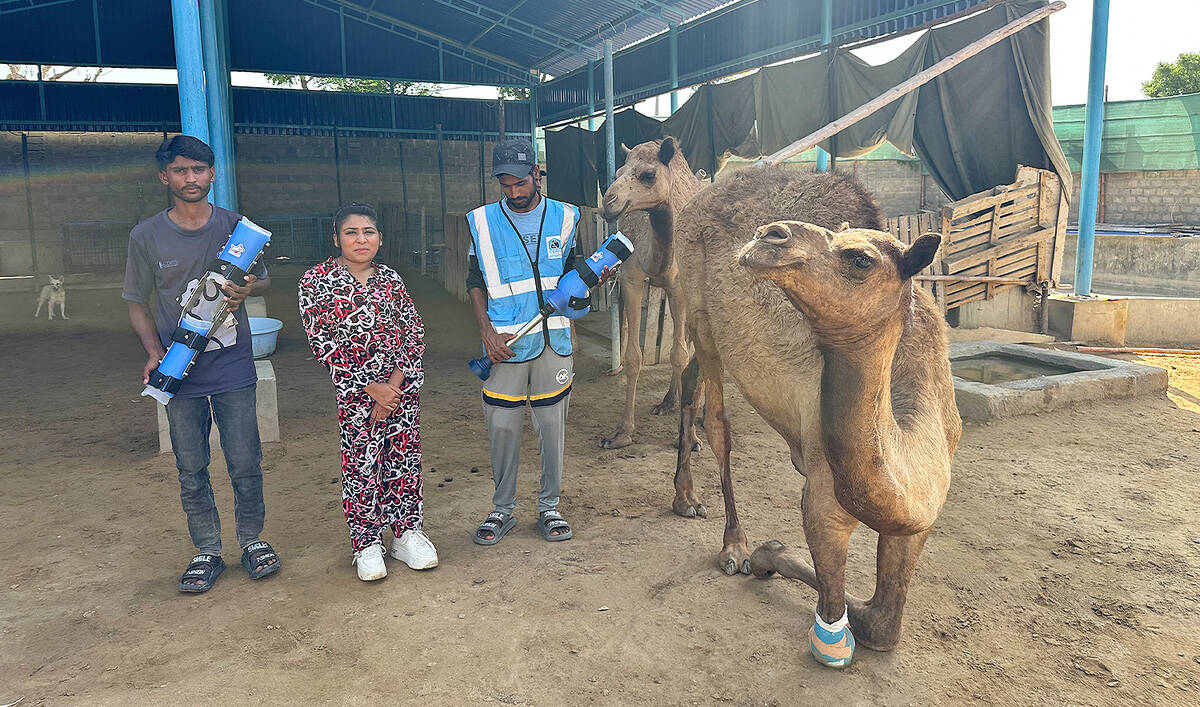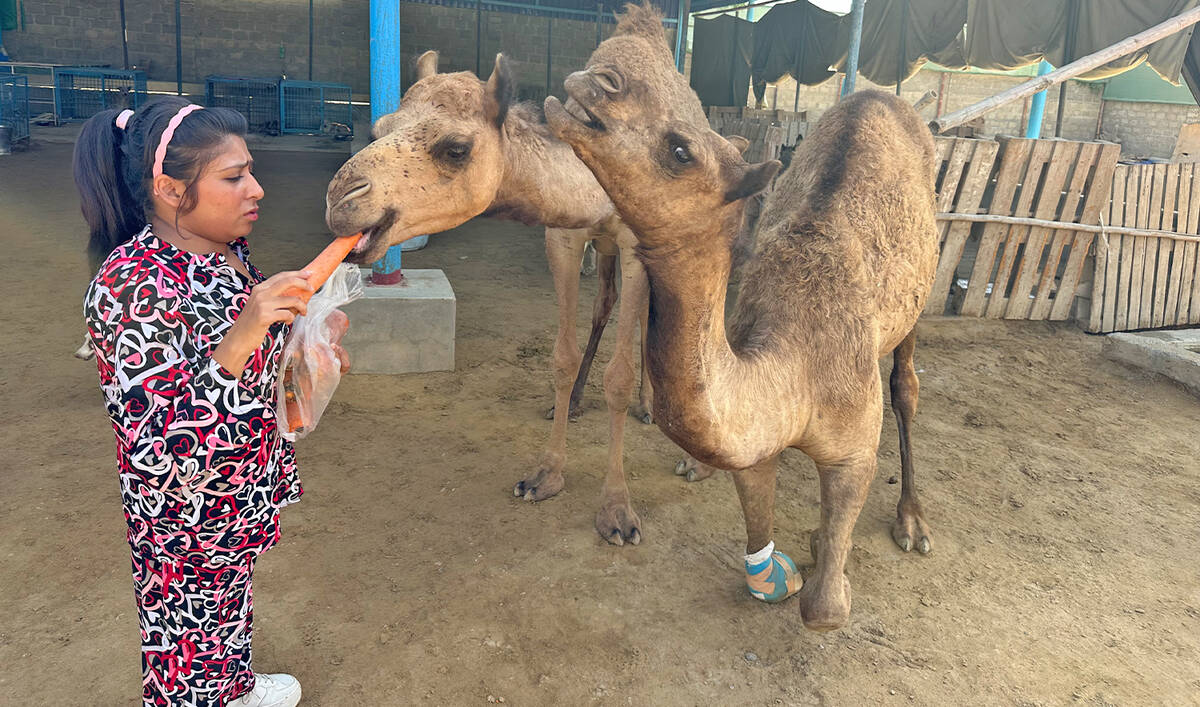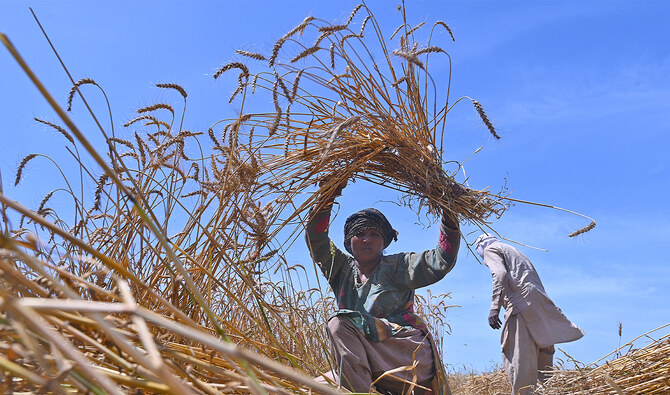ISLAMABAD: Pakistan’s National Food Security Minister Rana Tanveer Hussain on Sunday asked authorities to ensure timely sale of stored wheat to avoid financial losses to the country and to benefit farmers and consumers, ahead of the arrival of new crop.
Hussain issued the directives while presiding over a meeting to review wheat reserves, management strategies, and the selling process to avoid any future crises.
In Pakistan, wheat crop is planted in mid-December and the harvest usually begins in March, with the majority of the crop harvested between April and early June.
Last year, farmers in Pakistan held several protests over lower wheat prices due to the import of excess amounts of the commodity that flooded local markets.
“There would be zero tolerance for any delays in the wheat sale process as prolonged storage could impact the quality of wheat and lead to financial losses for the national treasury,” Hussain was quoted as saying by the government’s Press Information Department (PID).
Agriculture is the backbone of Pakistan’s economy and constitutes its largest sector. According to the Pakistan Bureau of Statistics (PBS), agriculture contributes about 24 percent of the Gross Domestic Product (GDP) and accounts for half of the employed labor force in the country.
However, the prices of wheat last year dropped significantly in Pakistan and were much below the government’s support price of Rs3,900 ($14) per 40-kilogram bag.
During Sunday’s meeting, Pakistan Agricultural Storage & Services Corporation (PASSCO) officials informed the minister they had strengthened coordination with different agencies and provincial authorities to accelerate the sale of wheat.
“Various measures have been implemented to ensure transparency in the wheat sale process, benefiting both farmers and consumers,” they were quoted as saying.
Hussain instructed PASSCO officials to devise effective policies to address administrative and financial challenges, ensuring smooth operations in the future, according to the PID. He reaffirmed the government’s commitment to agricultural development, food security, and farmers’ welfare.
Pakistan minister urges timely sale of stored wheat to avoid financial losses, benefit farmers
https://arab.news/6mw55
Pakistan minister urges timely sale of stored wheat to avoid financial losses, benefit farmers

- In Pakistan, the wheat crop is planted in mid-December and the majority of the crop is harvested between April and early June
- Pakistani farmers last year held several protests over lower wheat prices due to the import of excess wheat that flooded markets
Karachi beat Peshawar by 23 runs as PSL returns with glitzy ceremony

- Peshawar Zalmi skipper Babar Azam scores 94 runs from 49 balls in Zalmi’s chase attempt
- Pop stars Sahir Ali Bagga and Asrar Shah enthralled fans as PSL returned after May 9
ISLAMABAD: Peshawar Zalmi skipper Babar Azam’s 94-run innings came to naught as his team lost to Karachi Kings at the Rawalpindi Cricket Stadium by 23 runs on Saturday, as the Pakistan Super League (PSL) marked its return with a glitzy ceremony.
The PSL was suspended on May 9 due to hostilities between nuclear-armed neighbors India and Pakistan. However, as both countries agreed to a ceasefire on May 10, the Pakistan Cricket Board announced the league would resume on May 17.
Kings captain David Warner led the scoreboard, scoring a fiery 86-run inning from 50 balls while James Vince smashed 72 runs from 42 deliveries. Khushdil Shah contributed with an impressive 43 runs from 15 balls as the Kings piled on 237-4 at the end of 20 overs.
“Match 27 Karachi Kings vs Peshawar Zalmi,” the PCB said in a statement. “Karachi Kings won by 23 runs.”
Former Pakistan captain Azam scored 94 runs from 49 balls, hitting four sixes in his innings before he got run out. Explosive opener Saim Ayub provided Zalmi with a strong start, scoring 47 runs from 31 balls while Tom Kohler-Cadmore chipped in with 20 runs from 15 balls.
PSL’s return after a week saw Pakistan Interior Minister Mohsin Naqvi and Army Chief General Syed Asim Munir watch the match live at the Rawalpindi stadium.
Pakistani pop stars Sahir Ali Bagga and Asrar Shah performed to enthrall the audience and pay tribute to the country’s armed forces before fans enjoyed a spectacle of fireworks at the stadium.
Pakistan says eyeing transit hub role to connect South, Central Asian economies

- Pakistan Communications Minister Abdul Aleem Khan attends Kazan trade and investment forum in Russia
- Minister says Islamabad wants to increase landlocked Central Asian countries’ access to warm waters for trade
Islamabad: Pakistan’s Communications Minister Abdul Aleem Khan has said that Islamabad aims to emerge as a key transit hub connecting the economies of South and Central Asia, state-run media reported on Sunday.
Pakistan has been working to strengthen its position as a key trade and transit hub, connecting landlocked Central Asian states to the global market through its strategic location. Last year saw a surge in visits, investment discussions and economic activity between Pakistan and Central Asian nations as well as Gulf countries.
Khan was speaking at the “Russia-Islamic World: Kazan Forum” being held from May 13-18 in the country’s Kazan region. This forum is the main platform for economic cooperation between Russia and Islamic countries as per its website.
“Minister for Communications Abdul Aleem Khan says Pakistan aims to emerge as a key transit hub, bridging the economies of South Asia and Central Asia,” state broadcaster Radio Pakistan reported.
Addressing the closing session of the Kazan Forum, Khan noted the Gwadar Port in southwestern Pakistan has already started shipment and cargo services. He added that Islamabad intends to facilitate landlocked Central Asia’s access to warm waters.
Khan spoke about Pakistan’s strategic plans to connect its Karachi, Quetta and Gwadar cities with Central Asia and Europe through road networks.
“Abdul Aleem Khan welcomed the holding of the Kazan Forum and reaffirmed Pakistan’s strong commitment to playing an active role in regional development,” the report said.
Pakistan’s recent push to engage Central Asian countries and the Middle East takes place as Islamabad seeks to escape a prolonged macroeconomic crisis that has drained its country of financial resources and weakened its balance of payment position and currency.
Islamabad has sought to attract international investment in key economic sectors since it narrowly avoided a sovereign default in 2023 before a last-gasp International Monetary Fund (IMF) bailout helped it avoid that.
Pakistan, Iran agree to enhance trade and security cooperation

- Prime Minister Shehbaz Sharif, Iranian President Masoud Pezeshkian discuss bilateral cooperation over phone
- Sharif thanks Iranian president for Tehran’s role in defusing South Asia tensions between India and Pakistan
ISLAMABAD: Pakistan Prime Minister Shehbaz Sharif and Iranian President Masoud Pezeshkian this week agreed to enhance cooperation in trade, security and connectivity between the two countries, a statement from Sharif’s office said.
Pakistan and Iran have had a history of rocky relations despite several commercial pacts, with Islamabad being historically closer to Saudi Arabia and the United States.
Their highest profile agreement is a stalled gas supply deal signed in 2010 to build a pipeline from Iran’s South Fars gas field to Pakistan’s southern provinces of Balochistan and Sindh. Pakistan and Iran are also often at odds over instability on their shared porous border, with both countries routinely trading blame for not rooting out militancy.
“They agreed to enhance cooperation in all areas of shared interest, especially trade, connectivity, security and people-to-people contacts,” the Pakistani Prime Minister’s Office (PMO) said regarding a phone call between Sharif and Pezeshkian on Saturday.
It said the Iranian president invited Sharif to undertake an official visit to Tehran, which the Pakistani premier accepted.
The two officials also discussed Pakistan’s recent conflict with India, which saw at least 70 killed on both sides last week. India and Pakistan attacked each other with drones, missiles, artillery fire and fighter jets before Washington brokered a ceasefire between the two countries on May 10.
Sharif thanked Pezeshkian for Iran’s “sincere and brotherly diplomatic efforts” to defuse tensions in South Asia. He reaffirmed Pakistan’s “firm resolve” to defend its sovereignty and territorial integrity at all costs.
“The Prime Minister emphasized that Jammu and Kashmir dispute remained the root cause of instability in South Asia. He called for its just resolution, in accordance with the UN Security Council’s resolutions and the aspirations of the Kashmiri people, as key to enduring peace in the region,” the statement said.
‘Why did this happen to me?’: Maimed camel in Sindh finds new hope with prosthetic leg

- Cammie the camel lost her leg last year after a landlord attacked her for straying into his field for food
- A US-based company built a prosthetic leg and sent it to the shelter where she is recovering in Pakistan
KARACHI: A year after a brutal act of violence left her maimed and terrified, Cammie the camel is finally getting a second chance at life.
The young camel had wandered into a field in Sindh’s Sanghar district in search of food when a local landlord, enraged by the intrusion, hacked off her front leg. Her owner, a poor peasant, lacked the means and power to seek justice, even though livestock like Cammie often represent the sole source of livelihood for families in the region.
Despite the owner’s refusal to press charges, the state pursued the case under Pakistan’s animal cruelty laws, registering a case and arresting five people after widespread outrage.
Now, Cammie is in the final stages of her recovery, with a custom-made prosthetic leg ready to help restore her mobility.
“She was a very scared, nervous little child. The kind of child who would start screaming if she saw a new person,” Sheema Khan, manager of the shelter where Cammie has spent the past year, told Arab News.

Animal cruelty is not rare in Pakistan. Last year, another camel in Sindh was found dead with all four legs amputated. Animal rights groups have also highlighted the mistreatment of other creatures, such as bears that are illegally captured, tortured and forced to perform.
While Pakistan has animal welfare legislation, enforcement remains weak, sporadic and hampered by limited resources.
“There was always a question in Cammie’s eyes: ‘Why did this happen to me? I had only gone to find food because I was hungry,’” Khan said, adding that it was heartbreaking to see her in pain whenever she tried to stand.

The shelter, which has been caring for Cammie throughout her recovery, received early assistance from Pakistani startup Bioniks, which took precise measurements of her limbs to prepare for the prosthetic. These were then sent to the United States, where a specialist at the Virginia-based company Bionic Pets crafted the custom leg.
With the prosthetic in their possession, the shelter team hopes Cammie will soon walk, run and play like other animals around her.
When Cammie first arrived at the shelter, she received antibiotics, pain relief and a clean enclosure. But her recovery extended beyond the physical.
“Whether it’s a human or an animal, wounds and illnesses don’t go away until the mind is healed first,” said Dr. Babar Hussain, the veterinarian overseeing her treatment. “So first, we focused on her mental healing, and only after that did we start her treatment.”

Her wound, which was infected and bleeding, has now fully healed.
“She is completely fit now,” Hussain said. “The entire wound is closed, and new skin has grown over it. There’s nothing to worry about.”
To help Cammie emotionally, the shelter introduced another young female camel, Callie, as her companion.

“We brought in Callie so that seeing her would motivate Cammie, encourage her to try to play,” Khan said. “Now, Callie and Cammie live together.”
As luck would have it, Callie was an orphan around the same age, in need of a peaceful home. Their bond proved transformational.
“The very night we brought Callie in, Cammie stood up with her. That night, we saw Cammie standing, without any support, alongside her friend Callie.”
Asked when her team would give Cammie her new leg, Khan said: “If it were up to us, we would immediately fit Cammie with the prosthetic leg and tell her: ‘Cammie! Now you can walk on all four legs. Stand up, come on, run!’”
“But now, everything depends on Cammie — on when she’s ready for this,” she added.
As Cammie trains with a harness and prepares mentally for her new limb, the team is hopeful and excited to witness the movement, which Khan says will arrive soon.
“You can walk on all four legs,” she said she would tell Cammie once she starts walking. “You’re free to go wherever you want, to play, to run and jump.”
Pakistan to send delegation to key world capitals to highlight stance on India standoff

- PM Shehbaz Sharif has asked former foreign minister Bilawal Bhutto-Zardari to lead Pakistan’s diplomatic outreach
- The delegation will visit London, Washington, Paris, and Brussels in the coming days to counter India’s narrative
KARACHI: Prime Minister Shehbaz Sharif on Saturday tasked former foreign minister Bilawal Bhutto-Zardari with leading Pakistan’s diplomatic outreach to major international capitals to present the country’s perspective on the recent military conflict with India, as hostilities persist despite a US-brokered ceasefire following four days of cross-border strikes.
The move follows an April 22 gun attack in Indian-administered Kashmir that killed 26 tourists. India blamed Pakistan for the assault, a claim Islamabad denied while calling for an international investigation.
The incident triggered retaliatory military action by India across the Line of Control in Kashmir and in mainland Pakistan, followed by Islamabad’s reprisal strikes. US President Donald Trump later announced a ceasefire on May 10, with his administration saying the countries had agreed to begin talks at a neutral venue to resolve outstanding disputes.
However, India has pushed back against the understanding, with New Delhi announcing to dispatch a delegation to key world capitals earlier on Saturday. Pakistan’s decision to do the same came later in the day.
“The prime minister has decided to send a diplomatic delegation to expose Indian propaganda and nefarious conspiracies at the international level,” the Prime Minister’s Office said in a statement, adding that Sharif had contacted Bhutto-Zardari in this regard.
“The delegation will expose India’s propaganda and efforts to destabilize regional peace in London, Washington, Paris and Brussels,” it added.
Addressing a ceremony in Islamabad a day earlier, Sharif said India and Pakistan had fought several wars in the past, though these conflicts had not helped them resolve their disputes.
He urged India to begin dialogue to address mutual concerns and ensure peaceful coexistence.
Bhutto-Zardari also confirmed the assignment in a post on social media platform X.
“I was contacted earlier today by Prime Minister @CMShehbaz, who requested that I lead a delegation to present Pakistan’s case for peace on the international stage,” he wrote. “I am honored to accept this responsibility and remain committed to serving Pakistan in these challenging times.”
The delegation aims to lobby officials and diplomats on Pakistan’s narrative.
Besides Bhutto-Zardari, the team includes Musadik Malik, Khurram Dastgir Khan, Sherry Rehman, Hina Rabbani Khar, Faisal Subzwari and former diplomats Tehmina Janjua and Jalil Abbas Jilani.









